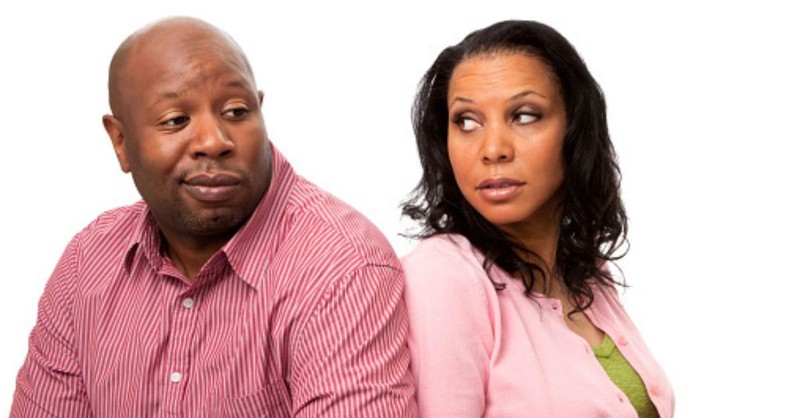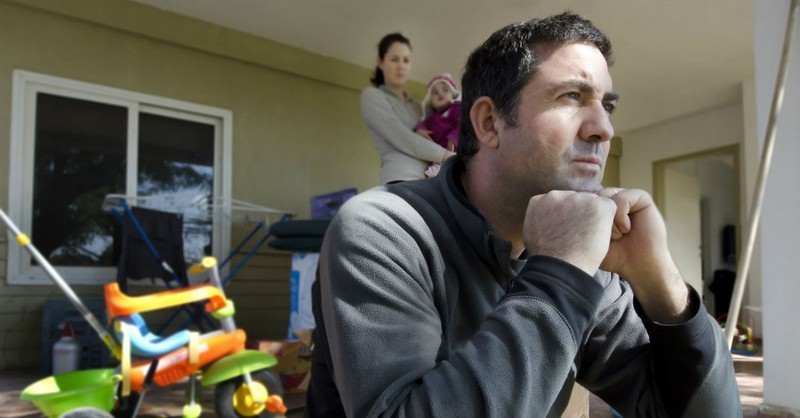
Counseling has ruined romantic comedies for me. When I watch the latest release, I’m soon yelling at the screen. “Get some therapy,” I shout, as the heroine talks to her best friend instead of her spouse about her marriage problems. My husband sighs, perhaps wishing I could enjoy the movie instead of indulging in armchair psychoanalysis.
It has been eye-opening to realize just how “normal” unhealthy relationships are. But I can’t judge—not long ago, I could not see my own unhealthy relationships. In truth, emotionally unhealthy patterns can feel like a funhouse—disorienting and full of upside-down logic. Toxic patterns can also seem the only possible way to handle our pain.
How do we change that?
Here’s a quick guide to relationship red flags so you can begin choosing healthy ways to love.
Photo Credit: Getty Images

1. Criticism
One of the most helpful resources for my husband as we pursued marriage therapy was the work of the Gottman Institute, specifically what its founder, John Gottman, calls the “four horses of the apocalypse.” After years of studying couples, Gottman realized that four communication styles in particular were so toxic that their repeated use was a very good way to predict divorce.
The first of those apocalyptic behaviors is criticism, which Gottman differentiates from critique or complaint. It’s healthy to be frank about problems, but if we offer “an attack on [our partners] at the core of their character,” we’re criticizing, and causing harm. Saying, “I felt angry when you didn’t call to tell me you were late,” is healthy. Yelling, “You’re a no-good, untrustworthy scumbag who doesn’t care if I worry,” is not. One focuses on what someone has done, the other on who they are. As Brené Brown points out, the latter approach is shaming, which destroys relationships.
Photo Credit: Thinkstock

2. Contempt
Gottman warns of another “horseman”— contempt.
Contempt could look like “disrespect, [mockery]…sarcasm, ridicule…eye-rolling or scoffing.” Or, put more simply, contempt is meanness.
I shudder when I think of some of the vile things I’ve said to people I love in the heat of anger. Contempt can even feel good in the moment, like winning a battle. But it has caused real harm in my relationships.
Photo Credit: Getty Images

3. Defensiveness
Defensiveness, Gottman says, is a third hallmark of a toxic relationship. It involves offering excuses or deflecting critique instead of owning our part in problems.
Defensive people turn critique back on the person offering it, no matter how justified the complaint. A defensive person whose spouse was angry about failing to call when they were late might say, “I don’t call because you always yell at me for having to work. You’re so ungrateful about how I provide for our family.” Not only do they not take responsibility for not calling, they change the subject altogether. This creates confusion, which makes avoiding responsibility easier. Defensive people provide no way to find mutual ground or problem-solve together.
Photo Credit: Dima Sidelnikov/Thinkstock

4. Stonewalling
Stonewalling builds a metaphorical barrier. Rather than responding to the loved one, a stonewaller will go silent, leave, make themselves unavailable through busyness, or simply refuse to discuss anything uncomfortable.
In fact, all four of these “horsemen” are like steps in a seamless, but terrible dance. Each move and counter-move drives people further apart, giving them less common ground to stand on.
Photo Credit: Digital Skillet/Thinkstock

5. Punishment
Besides Gottman’s “horsemen,” I’ve learned about other hallmarks of unhealthy relationships. The first is any desire to be punitive.
When people hurt me, I have two options. One is to be like Christ Jesus, responding to hurt without rancor. The other is to try to make the person who hurt me sorry.
Using the silent treatment, responding with hostility, using cuss words or contempt, and becoming cold and withdrawn are all ways of punishing other people. Our anger can be justified, but punishment is not.
Photo Credit: Chameleonseye/Thinkstock

6. Gaslighting
The term “gaslighting” comes from a play called “Gaslight,” later made into an Ingrid Bergman movie. In it, a wife notices the gas lights in her house flickering. When she mentions it to her husband, he tells her she’s crazy. Unbeknownst to her, he has intentionally sabotaged the lights to convince his wife she’s insane.
Gaslighting is a manipulative form of defensiveness. Rather than responding forthrightly to critique, gaslighters tell the person complaining that they’re “crazy,” “making things up” or otherwise not to be believed. It’s a form of emotional abuse that makes victims “question their own memory, perception, and sanity.”
Photo Credit: Thinkstock

7. Passive aggression
Passive aggressive people avoid expressing their anger directly, instead cloaking it in inaction. They “forget” to follow through on promises, put off difficult conversations, or shut down during an argument. When confronted, they say they “haven’t done anything.” That’s literally true, but their inaction is still harmful.
I contrast this maddening dynamic with the forthrightness of Christ. Confronted by manipulative Pharisees, suspicious Samaritans, and unreliable disciples, he speaks with refreshing frankness. Likewise, Paul answers his critics directly and stands by his actions.
Unfortunately, in Christian culture that prizes niceness over honesty, passive aggression can be a way of veiling our contempt and anger while being able to claim that we “love” our enemies.
Photo Credit: Thinkstock

8. Resentment
I’ve always known resentment was a sin and was bewildered why this ugly emotion plagued me. If I were giving, nice, and loving, why should I feel resentment towards people I loved?
I know now that resentment is a hallmark of poor boundaries. When I give and give, fail to air my problems forthrightly, or neglect my own needs, resentment rears its ugly head.
Resentment surfaces when I try to “save” people. But I’m not a savior—Jesus is. Now I find resentment a warning that I need to trust the One whose power can actually transform lives.
Photo Credit: Thinkstock

9. Triangulation
Triangulation is like an emotional game of telephone. Rather than talking directly to the person we have problems with, we first approach someone else—our child, another friend, a parent—and speak about the problem to them instead. We may even ask them to be a go-between for us and the person we’re upset with—forming a triangle of dysfunction.
In contrast, Jesus calls on us to deal with our problems directly. In Matthew 5:21-25, when discussing murder, Christ says to resolve disagreements as quickly and directly as possible. “Leave immediately,” the Message translates his command. “Don’t lose a minute. Make the first move.” We can kill each other’s spirits with gossip and neglect.
Photo Credit: Thinkstock

10. Waiting for the other person to change
I used to think relationship problems were a fifty-fifty proposition; each person contributed equally to dysfunction, and so each person had equal work to do. Now, I know that’s naïve. Especially in abusive marriages or families, one person can create the majority of harm within a relationship. It’s neither fair nor healthy to assume each person shares equal blame.
Still, even if you’re a victim of abuse, you still have choices*. In my most difficult relationships, I caused myself and others real harm by deciding there was nothing I could do if the other person wouldn’t change. That ignored the fact that I could change—that I could learn to advocate for myself, establish firm boundaries, and say no when appropriate.
I’ve heard too many people tell me that seeking therapy is useless unless the other party changes. This kind of hopelessness keeps both people locked in dysfunction and denies the real power God has to transform every relationship, no matter how troubled.
*Leaving abusive relationships can be dangerous. If you feel unsafe in your relationship, seek help with the National Domestic Violence Hotline. Also, be kind to yourself. You’re not alone in struggling with these difficult relationships.
Photo Credit: Thinkstock

Resurrection is Bad and Good News
Thanks be to God, there is always a way forward. But we also need to be realistic. Seeking resurrection always involves a kind of death—the death of what we know, hope for, and especially the demise of coping mechanisms that feel safe, powerful, and familiar. Often our unhealthy choices are our weapons—they feel like the only thing keeping us from getting hurt.
Like Eustace becoming a dragon in CS Lewis’ The Voyage of the Dawn Treader, we let our skin get thick to protect ourselves—but as a result, we are transformed into something less than human. We can be resurrected—but it might be painful, especially at first.
With the help of the Holy Spirit, may each of us recognize the unhealthy ways we love others. May we lay down our serrated weapons of war, and instead pick up the craftsman’s tools Jesus urges us to use instead: honesty, forgiveness, wise counsel, clear, loving no’s, and the humility to admit when we are wrong.
 Heather Caliri is a writer from San Diego who uses tiny, joyful yeses to free herself from anxiety. Tired of anxiety controlling your life? Try her mini-course, “Five Tiny Ideas for Managing Anxiety," for free here.
Heather Caliri is a writer from San Diego who uses tiny, joyful yeses to free herself from anxiety. Tired of anxiety controlling your life? Try her mini-course, “Five Tiny Ideas for Managing Anxiety," for free here.
Photo Credit: Mbolina/Thinkstock
Originally published Tuesday, 18 February 2020.



